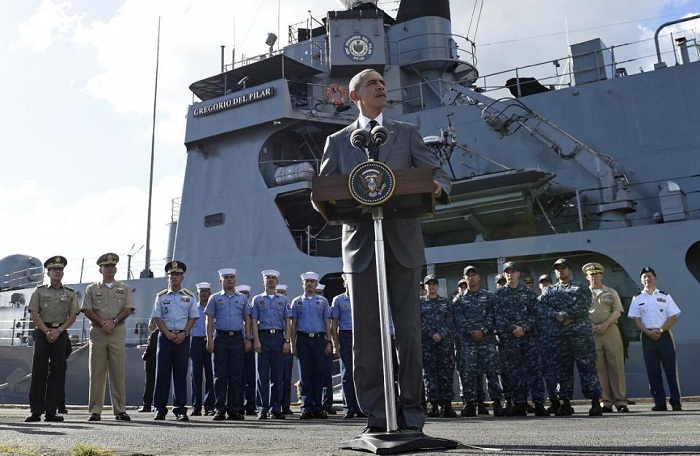In signal to China, Obama to give 2 ships to Philippines

"More capable navies, in partnership with the United States, are critical to the security of this region," Obama said as he opened a six-day tour of the Philippines and Malaysia. He said the ships would help the Philippines navigate and patrol its territorial waters.
Obama never mentioned China by name as he stood in front of the BRP Gregorio del Pilar, a onetime U.S.-owned frigate, but the intended recipient of his message was clear. As regional tensions with China have simmered in recent years, the U.S. has sought out symbolic ways to counter Beijing`s claims in the region without putting itself in direct confrontation with the powerhouse nation.
Earlier this month, U.S. Defense Secretary Ash Carter boarded a U.S. aircraft carrier plodding through the South China Sea, a week after a U.S. Navy destroyer patrolled within seven miles of a reef where China is building an artificial island and has asserted a 12-mile territorial boundary. The U.S. has refused to comply with China`s self-proclaimed air defense zone over the nearby East China Sea.
Obama`s announcement came at the start of his ninth trip to Asia, and this one, like the others, was designed to illustrate his efforts to strengthen alliances as part of his seven-year campaign to increase U.S. influence in Asia.
"You can count on the United States," the president said.
During back-to-back summits in Manila and Kuala Lumpur, Obama planned a particular focus on touting the Trans-Pacific Partnership that the U.S. recently struck with 11 other nations — China not included. The sweeping free trade agreement is at the heart of Obama`s Asia policy, but its prospects for ratification by U.S. lawmakers remain uncertain.
Flanked by U.S. and Philippine troops, Obama said he would seek to provide another $140 million in maritime security aid to Southeast Asia next year, although it was unclear whether Congress would approve those funds.
The Philippine government`s eagerness for more muscular U.S. military assistance here illustrates how concerns about China appear to have superseded the nation`s resentment of its former colonial master and its reluctance to give U.S. troops free reign. Yet while Obama`s commitments fall short of what some countries in the region have sought, not all of that is Obama`s doing.
On his last trip here, in 2014, Obama signed a defense cooperation pact allowing the U.S. to base troops temporarily at some military camps, but a legal challenge has delayed implementation. Although the country`s pallid military has struggled to push back effectively against China, the Philippine constitution bars permanent U.S. bases.
Six Asian countries assert overlapping claims to parts of the South China Sea, and Beijing is locked in a parallel dispute with Japan and South Korea over the East China Sea. China views control of the waters, with their abundant underwater oil deposits and strategic shipping lanes, as key to its rise as a major economic and military power.
China`s ongoing march in contested waters has become a major tension point with the U.S., joining cyber-spying, human rights and trade disputes. Still, Obama has sought to foster a productive relationship with China, striking major deals with Beijing over climate change.
Yet, Obama`s desired emphasis on U.S.-Asia ties is being overshadowed by global hand-wringing over the Islamic State group`s ghastly attacks in Paris. Meeting Tuesday with Australia`s new prime minister, Obama called for better outreach to Muslim communities to prevent radicalization.
"We will continue shoulder to shoulder with the U.S. and our allies in the fight against this type of extremist violence," said Australian Prime Minister Malcolm Turnbull.















































